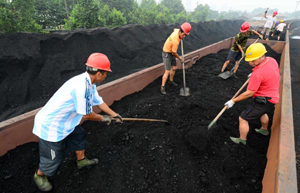New policy may benefit domestic firms, but issues like oversupply, dwindling demand persist, reports Du Juan.
China's decision to reimpose tariffs on imported coal from Wednesday will help domestic coal producers in the short term and pose hardships for Chinese traders and foreign companies in the long run, experts said.
An immediate fallout of the decision by the world's biggest coal producer and consumer would be a sharp reduction in coal imports from Australia, the United States and Russia, they said.
Last Thursday, the tariff committee decided to impose taxes of 3 percent on anthracite and coking coal, 6 percent on thermal coal and 5 percent on briquettes, an alternative fuel source manufactured from coal. The committee also decided to reintroduce the 6 percent import tax set in 2005 on all varieties of coal, with the exception of coking coal.
Though the import tax was abolished in 2007, the decision to reintroduce it comes after a sharp fall in domestic coal prices and huge losses reported by coal producers due to production cuts and mounting wage bills.
"The new policy will reduce China's coal imports to some extent and help domestic coal companies in the short term," said Deng Shun, a coal analyst with ICIS C1 Energy, a Shanghai-based energy information consultancy.
Private coal traders, on the other hand, could see significant profit reductions because of the policy change, Deng said.
As the new rule started to take effect on Wednesday, some traders, whose cargoes with prices already set are still at sea, will face up to 6 percent tariff when the cargoes arrive.
Zeng Hao, a coal analyst with Fenwei Energy Co, an industrial consultancy based in Shanxi province, China's biggest coal producer, said: "They (foreign companies) will have to absorb the price rise, especially if the downstream users don't agree to bear the costs."
A coal trader who declined to be named said he could suffer a loss of more than 2 million yuan ($330,000) on each shipload of 100,000 metric tons of coal, due to the new tariffs.
China imported around 160 million tons of coal, with a total value of $12.67 billion, during the first six months of the year, according to customs data. The new policy will cause more hardships to foreign coal suppliers, who are already cutting costs to weather the slowing demand from China.
Dai Bing, director of the coal industry information department at JYD Online Corp, a Beijing-based bulk commodity consultancy, said Australia would bear the brunt of the new policy as it is the largest coking coal supplier to China.
"The real impact will be felt in May next year, when the domestic demand from steel mills for coking coal rises. The cost of Australian coal exported to China will increase by $3 to $5 a ton because of the tariff," he said.
At present, the CIF (cost, insurance and freight) price of Australian coal in China is around $67 a ton, according to JYD. The Australian producers will have to lower their offer to $64 a ton by then for traders to make up for the added tariff cost.
Dai said the unit profit for China's coal traders is about $1 at the most, and the new policy will weaken the enthusiasm of the traders in the market.
Some varieties of coking coal would continue to be imported from Australia due to the growing demand for high-quality fuel material from industries like steel, Dai said, adding that this would lead to higher domestic coking coal prices.
|
 |
 |
| China's thermal coal import outlook remains weak: Fitch | China reforms resource tax on coal |
